Fantasy. Lunacy. All revolutions are, until they happen, then they are historical inevitabilities. ― David Mitchell, Cloud Atlas
It is clear that we are in fact living through a revolution. Now whether this revolution is “won” at the cost of human creativity in praise of robotic ingenuity is yet to be determined.
But can we let you in on a little secret?
Things only have as much power as you give them. And man, have we been giving AI some serious power. But not just AI - studios, streaming, corporate greed, capitalism, CEOs - the elite or “Big Tech” are running laps around our frantic minds, yes, because they control the media but more so because we lack things like a cohesive vision or path forward to truly stand united against them.
But that is changing in real time.
And as people who have given their lives to telling stories, we should know the power of one.
So why does it seem so damn hard right now for people to believe in this better story?
I’m sure it’s something to do with our individual and collective pasts rearing their ugly head at us each and every day like it’s your favorite horror flick. And I get it, the past can be a seemingly inescapable thing, but what is one to do when all this future is staring directly at us??
Last week we ended with a pitch for a perspective shift:
The relative lack of clear genres and categories in the direct to consumer world is a crucial concept… to understand, as once you’ve grasped the rule-less, permission-less, boundary-less nature of this market, the more likely lightbulbs will start going off in your head.
After all, in this space the only limit on success is your ideas, dedication and willingness to keep going until you hit a rich seam with audiences -Jen Topping
This week Ellis and I had a conversation with someone who is not only actively exploring and defining the creator economy/ filmmaker pipeline right now but taking the “boundary-less nature of this market” and paving a tangible path forward.
Max Reisinger is the CEO of Creator Camp, a company that hosts events geared specifically towards filmmakers who cut their teeth on the internet. Throughout the year, the company hosts retreats across the globe with these visionary filmmakers to hone their craft and it culminated into the Camp Film Festival this past April in Austin, Texas. With 100 days to prepare, the festival sold 1100 tickets at Paramount Theatre and premiered 9 short films and 1 feature film all made by filmmakers who they met online.
Max and his team are at the forefront of what the future of film could (will) look like.
We hope you enjoy the chat!
A Conversation with Creator Camp’s Max Reisinger
Ellis
I know Taylor is going to follow up to this, but let's just simply start with, like, bro, who are you?
How did we get here? Lead us on your journey to Creator Camp?
Max
I think probably because of YouTube, when I was fifteen, I started making YouTube videos. My family moved to France for a year, and my mom's like, "We're putting me in the public school." I didn't speak French. I didn't have any friends, and I was like, "Wow, this is going to be an interesting experience."
The perfect time to document it, to look back on it, and then to share for folks back at home. And that's what kicked off my whole internet career, business career, was just posting YouTube videos.
That's how I met my best friends, my co-founders, and that's why I'm living here in Austin today. Yeah, that's really how it all got started, just telling stories on the Internet.
Taylor
And what made you transition into “I want to be a filmmaker and not just a YouTuber?” Not that there's anything wrong with being just a YouTuber.
Max
Yeah, and what's the difference anyways?
Taylor
No, seriously, touch upon that question because I feel like that it’s defining where we're going. Literally, what is the difference? We have so many preconceived ideas surrounding prestige TV versus content, but it's all the same at the moment.
So how are you navigating that space?
Max
I think that the moment in which I switched my mentality [was] when I was first posting videos and was like how do I document this? And what am I maybe trying to say? I was really focused on what am I trying to say? What's the message?
And I met a friend and fellow creator, this guy named Ryan Eng. And I sent him my video for feedback one time and I thought he was gonna give me great feedback and I kind of boost my ego. Like, “this video looks awesome”…And he just hit me with this line of notes. And he [said] you know, the music doesn't make you feel anything. It doesn't push the story forward. That part. I'm like, holy cow. He'd gone to film school and so he had a whole different understanding of the medium and film/video in general. But it was really like the music is not motivating, the feeling or the story.
I was like, "I've never even thought about that before, because I had no film background. I wouldn't have called myself a cinephile. I didn't want to go to film school or anything."
That's when it shifted from "what do I want to say?" to "what do I want to make people feel?" That just became a really interesting thing to figure out how to do.
Because I'd grown up watching videos on YouTube and they made me feel things.
That kicked off this whole YouTube journey for me.
Ellis
What do you feel are some of the biggest problems right now [in the world of film and media and content] and where do you see you guys in all of that? What is the void that makes the timing great for you guys to really make a dent in the world?
Max
Yeah, someone said to me a while back that Hollywood used to be the center of culture, but now the Internet is the center of culture. I think attention is shifting how we consume media.
I think the problem that I grew up with and experienced myself as a creator is that there are so many more people now who can tell stories and should be able to tell stories, but the infrastructure to support them, to fund them, a lot of that doesn't really exist today. I think there are very few opportunities that exist in the film industry, and I think that's what we're most excited about: how can we fund more stories and fill a new gap in the market that doesn't exist and find a new model that is more Internet-centric, more democratized, and fills this empty space.
There are a lot of common problems that you can see with Hollywood that make what we're doing more obvious to some people. But at the same time that infrastructure doesn't exist at all.
That's what we're trying to figure out now is can you make a $100,000 feature film? And can you make that profitable? If a streamer doesn't want to buy it, for example, how could you make money? Can you go directly to fans, can you sell merchandise, can you sell tickets?
And that's a lot of our work now is figuring out new ways that don't exist yet.
Ellis
I do feel like, as a culture, there's becoming a bigger critical mass of people who actually care about the social interaction with others especially since COVID did a number on all of us, right? We all sort of lost our way in a lot of ways, but we forgot that actually it's about bringing people together. It seems that every industry has figured things out and made their way back to where they were pre-COVID except for the film industry. I feel like there's an opportunity to figure out how you can bring back that type of audience in a new way that transforms to what's needed in this day and age.
That's just my opinion about it, but I assume, based on how you guys are doing [it], you guys probably see something similar?
Taylor
Yeah I actually feel like we have a lot of similarities in how we're approaching it because everyone keeps talking about $200 million movies right and that just doesn't interest me. It's like, how can you then scale it back? Knowing that you are a good storyteller and that you have something to say, how can you then create something for less than a million or it may be just right at million?
Then find the entry points to where the audience is and watch that grow and grow. It's something we [want to do with our films] build the campaign strategy individually for each film and then [what does that look like] across a slate of films to then build the momentum.
Max
Yeah, I think we feel the exact same way. I think, to your point [Ellis], everything's rebounded but film. Then, it begs the question of why it hasn't rebounded.
Maybe there are a lot of different factors. Maybe it's a culture thing [with] the content itself. These 200 million-dollar movies that people don't connect with in the same way.
But I think, regardless of what Hollywood is doing, we just see it as a big opportunity to fill and again, [to] use the Internet to bring people together. So, we're excited to find ways to revitalize the actual experience, and then I think there's something really cool about putting it in person [instead of] just on a phone. [Streaming] is like an experience that you can only optimize so much. If I'm watching something on Netflix versus YouTube, Hulu, it's all the same.
But watching it in person with people is a fundamentally different experience. There's something really magical about that that never goes away.

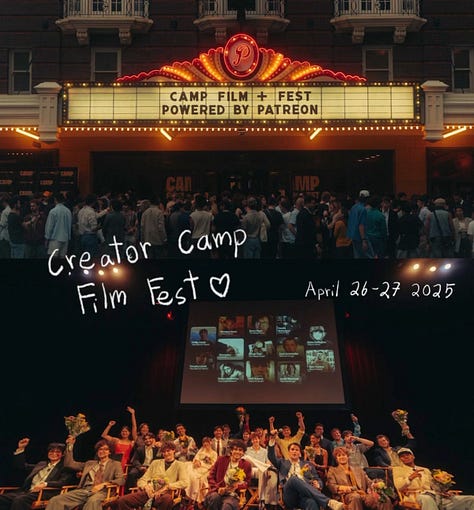
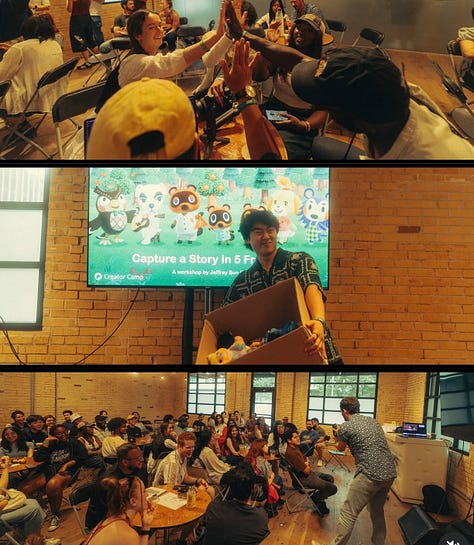
Taylor
It's very exciting. And that leads into my curation question. I'm sure you trust your own instincts but how did you choose who made it into the film festival and what stories you wanted to champion?
Max
Yeah, we were fortunate because our background was in the events industry. So we started as a nonprofit because we were making no money, we were losing money. Just trying to bring artists together, bring folks online who care about the same things that we care about.
After running many events and bringing together those we thought to be the most talented storytellers on the internet, it was very clear. And that helped motivate us to launch the first cohort and do the first festival because we were like, "holy cow, look at this talent, we want to see what they're capable of doing."
So it's very personal. We knew these folks, there was no scientific formula, we didn't have to go find it. It was in front of our face for so long, we were like, "please, let us do this."
So, they all took a big bet and risk on us as well, but yes, [it was] through events.
Ellis
What were the biggest challenges you had in trying to put on the film festival? And with running [your] company. Because most people aren't doing what you're doing, and that's because it's really freaking hard, right? So, what are the hard parts?…What sort of things are you guys going through that are causing some setbacks and are the things you're trying to solve right now?
Max
Yeah, with the festival, I think the hardest thing for us was wrapping our minds around a thousand people coming to an event and figuring out what that experience is going to be and feel like, because there's so many things that you just don't know with events.
The largest event we've done before was with a hundred people, but this is like a whole different [thing.] We had to think about security. We were working with a union for the Paramount Theater and they have all these different rules and regulations. We had to make ten movies in a hundred days and figure out the right formats to put them in the theater, get the audio, and do the five-to-one audio formatting.
Everything is new and scary, and it feels like there are a lot of things you have to get right for the experience. With events, you get a couple of things wrong, and it's really wrong. So, that was nerve-wracking for us, just making sure we're delivering this experience and that people have fun, that they want to come back because there are people who flew from China, Australia, and all over the world for this.
We have never done it before, so that's nerve-wracking.
Ellis
And on that, one thing you guys really tapped into is even though you guys made a name for yourselves in the internet space, there's still a power in bringing people together. Whether it's your retreats or the festival, how do you guys figure out how to keep that passion at the end of the day?
Max
Yeah. I think we try to view the internet as a tool to connect us, and I think that is what I believe the internet is for, as opposed to furthering us away from each other.
So, it feels like a foundational principle that all of these events were rooted in, bringing people together online in person. It’s fundamental to our DNA and [it’s] what excites us and what feels the most meaningful. It just feels deeply rooted in how we think about everything that we're building.
Taylor
That brings up what I wanted to talk about, because I do think this is the future. You're building your audience online because everyone's fragmented, everyone's socially isolated. We're all a little scared of each other at the moment. What was it like…to have created the buzz around this festival online and then to witness it in person. Because Ellis and I both believe in the magic of the theatrical experience and how it's necessary for the future of cinema.
Max
It was magical. Better than expected. We were admittedly afraid of what it would feel like because when you think about doing something at the scale of a thousand people, is it going to feel connected? Will it feel intimate? How is this experience going to be? Because all we've known is smaller events where we know everyone and we know their names, everything about them. So, it was better beyond belief.
I think it points to the fact that everyone here is united by something, and that shared energy is why it felt so impactful. It fueled us in our motivation to double down on what we're doing.
People care. And the energy that everyone felt is so unbelievably different from anything that is out there today. But, yeah, it was awesome.
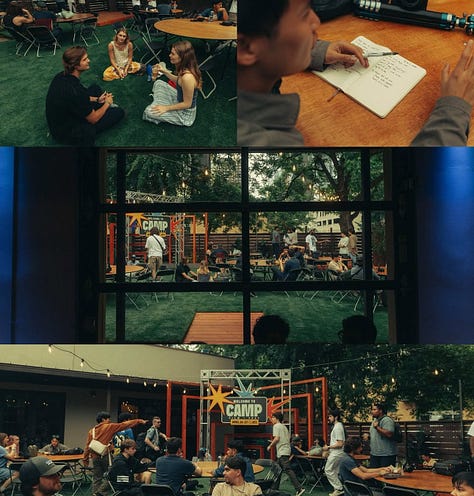
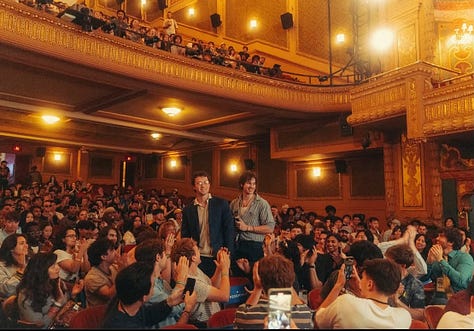
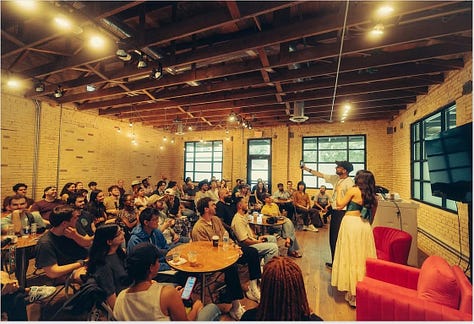
Taylor
That's amazing. What was the aftermath? [How has] the audience response been? Did that translate at all online momentum-wise? Where people are like, "cannot wait for you all to do another event?
Max
Yeah, everyone's asking, "When's the next one? How do I get involved?" People are sending us scripts. It's been really cool to see the recognition or the response afterwards.
Taylor
We see it on Substack a lot where people are like, my gosh, cinema is worthy of dedicating your time to it. It's worthy of getting right and telling it in a way that feels authentic and artistically crafted. That being said, how [were] the films? Was there one that just hit different on screen from what the process was like filming it?
Because it was a quick turnaround.
Max
Yeah, I mean, the feature blew me away because they had less than 100 days to make a feature film. Write it. Shoot it. Edit it. That's inconceivable from a traditional standpoint.
So that one just blew me away. It was really good. Now we're trying to figure out how to get it to a thousand theaters across the US. How do we really push it out there into culture at a wider scale? So that one I'm excited for everyone to see, because it was just incredible.
Taylor
And I mean, that is literally the case study for what we're talking about. Can you make a $100,000 film or a million dollar film and make it profitable and make people want to see it? And [I think] we know the answer, but it's proving it time and time again. So well done.

Ellis
What do you feel like is the next logical step [after the film festival?] Trying to get these movies out there, is that what your energy is focused on?
Max
Yeah, it's a good question. I think it's what we spend a lot of time on, even afterwards. Everyone's asking, "when's the next one or what are you doing next?"
I don't know. I could give some big answer, here's what we're doing. [But] I think how we felt afterwards is like there's something here and we don't know exactly what it will be or where we're going to end up in the next five years, but we're going to try a lot of different things.
I think one is taking the feature films to theaters and experimenting with that. What is it like to self-distribute too? Can we double down? Make different types of content? Can we experiment with different formats, giving people different opportunities? Can we just fund more projects and see if we can create things that don't even exist today?
Can we question what it means to make a film? What is a film? What does a show look like? What are different ways that we can make things, and then experiment with different tools that are coming out today?
I guess those are the biggest things. How can we make really interesting stuff, and then distribute it in new and exciting ways? I think that is where the whole business, at its core.
I think the hardest thing is that what we're trying to do doesn't exist, so you're closing your eyes and looking in the dark and there are a million things you could do at any moment.
I think anything early stage is terrifying in some moments and super exciting in other moments. I think what helps us and what has been the most helpful is finding people that believe and understand, surrounding ourselves with those people, being open to feedback, and people who completely disagree, which is [also] helpful, but I think it's a game of survival for us. Honestly. And making it fun and good.
And I think eventually we'll solve the problem. But I think the moment we sort of deviate from that, the moment it doesn't become fun, the moment we don't care then why do it at all, you know?
Ellis
That's right. The last thing we have for you, Max, is just some advice or tips you have for filmmakers who want to start building their audiences and establishing their brands online.
How can someone position themselves to get on your radar?
Max
Yeah, good question. I think I can only speak with what's worked for me, but whenever I put out my story on the Internet, it paid dividends.
That's how I met some of my closest friends, and that's how everything came together for me and my life. So, I think the Internet is a cool tool. That's how you guys met. That's how I met my friends. I think lean into that.
I think there's a lot of rules, tips, and ways to be a filmmaker. I think what's cool about this age is that all that is being rewritten, and there are new things being built that you can build and be a part of.
And if you're watching this, reach out. Shoot me an email. The world isn't as big as we might think, the Internet makes it small, which is special.
You cannot buy the revolution. You cannot make the revolution. You can only be the revolution. It is in your spirit, or it is nowhere. — Ursula K. Le Guin
**this interview has been edited and condensed for brevity’s sake.
To learn more about the Creator Camp Team, check out their Youtube Channel here.

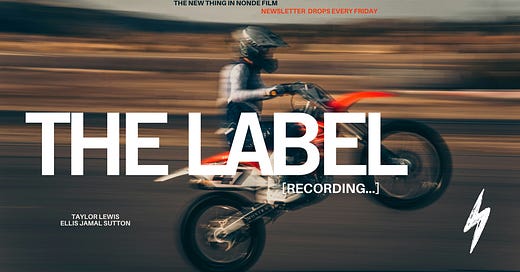






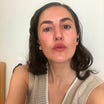

While reading, it struck me that watching two people who are building something new connect with someone else who is building something new to share ideas isn't really an interview, which is what I was expecting. It's a conversation, exactly as you titled it. A dialogue (trialogue?).
More than that even -- it's the foundation of a community. Looking forward to more of this!
I really enjoyed the read! I am excited about all that is going to come.